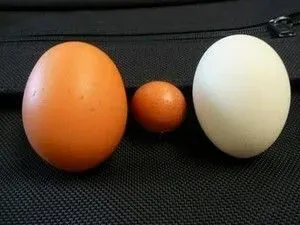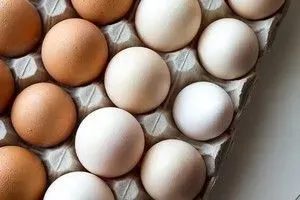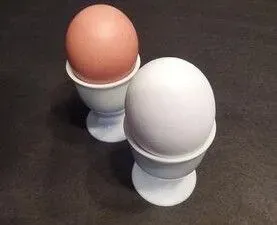Hens Eggs – The Difference Between Brown Eggs And White Eggs
Even when a hen lays white eggs or brown eggs – there seems to be a controversy with hens eggs.
Why, and what are they.
Let’s find out, shall we?
Hens Eggs – The Difference Between Brown Eggs And White Eggs
Yes…
Like it or not.
We seem to have this idea that they should be pitted against the other.
Which is better?
Really!
They are just hens eggs, right?
So why are we pitting the coloured against each other?
There are all sorts of rumours surrounding brown eggs and white eggs.

Some people say that brown eggs a better for you and contain more nutrients.
Some people think that brown eggs are better for cooking things like quiches.
While white eggs hens eggs are better for cooking things like cakes or vice versa.
Depending on who you talk to.
Uncovering The Truth Amongst All Of The Myths
And so here is the fascinating difference between brown eggs and white eggs.
Brown eggs are brown, white eggs are white – seriously!
Much like humans, whether the egg is brown or white they are the same inside.
Though in the case of eggs with one minor caveat which we’ll get to in a minute that has nothing to do with whether the chicken is a brown egg layer or white.
Yet besides that caveat, a brown egg or a white egg will give you the same amount of nutrition they taste.
Quiches and cakes also contrary to popular belief two also have more or less the same shell thickness on average.
If you’ve previously noted a difference here, this is likely to do with the age of the hen.
As young hens tend to lay eggs with shells that are typically harder than older chicken’s eggs.
But this is true for both white and brown egg layers as well.
How did these rumours start about brown eggs?
The young better is thought to be because they are often more expensive at supermarkets, at least in the States
Whether these hens eggs are better quality or better for you in this case or not.
Increasing the price of something sometimes drastically is occasionally used as a marketing trick to get people to think one product is better than a comparably cheaper product.
See also The Truth Behind Fake Chicken Coop Eggs
Nothing much difference here…
As far as egg prices go…
Brown eggs cost more.
This is in part because then the Lathan usually eats more.
This means the hens cost more to keep per egg.
You see white eggs are most often laid by white or light.
And the brown eggs are most often laid by red-feathered or brown dark hens.
They are the chickens with red earlobes, this is not the universal truth.
It is just a general rule…
Furthermore…
The chicken’s earlobes are really the indicator here not the feathers.
But there is a very strong correlation between earlobe colour and feather colour.
So, feather colour can be a decent indicator to ultimately egg colour is determined by genetics.
But the earlobe feather colour thing is a good indicator larger than their white lobe counterparts.

Which is why they eat more.
You see…
The farmers need to get reimbursed for the extra feed somehow so they up the price of the brown eggs.
And this also explains why white eggs tend to be more popular in supermarkets in some other regions of the world.
If the chickens cost less for farmers to keep, which leads to cheaper eggs for the consumer.
This then leads to grocers buying more white eggs to put on their shelves to offer this product cheaper to their customers.
Somewhat effective in the general case…
There is also a commonly touted myth that brown hens eggs taste better.
And that is why they are more expensive in the marketplace.
So the white egg brown egg taste difference is a myth.
But the potential difference in taste from one egg to another does lead us to the one caveat.
Though it is not have anything to do with the colour of the egg.
Rather, this has to do with the overall chicken’s diet.
Many chickens raised at home are brown egg layers.
While most of the chickens raised for commercial use are white egg layers.
The eggs and even the colour of the yolk are similar to how diet can drastically affect the taste of meat.
See also So... What Breed Of Chickens Lay Jumbo Eggs Then?
However, if you were to take one of those brown egg-laying chickens and raise it on the same food as a white egg-laying chicken.
The hen’s eggs would taste the same and be otherwise indistinguishable.
Aside from the colour of the shell if their diets are the same.
The yolks will even be identical in colour.
Today chickens raised for commercial purposes we’re layers of white eggs or brown.
Are you all getting a slight variance from company to company if you have had some brown eggs from a neighbour.
Or a chicken of your own.
That is fair a difference in diets than commercially fed chickens eat.
As you can imagine, that you would be giving them treats.
This would not happen so much on a commercial chicken farm.
They treat them well enough.
Don’t get me wrong there.
But with so many chickens running about, you would not be giving them such treats.
As you would with a hand full of chickens in your own back yard, and when they all have individual names.
Can you imagine naming hundreds of chickens?

Did not think so.
You would just run out of names to give them…
Then there may be a difference in taste.
It just doesn’t have anything to do with the colour of the egg.
So if brown egg-laying chickens are more expensive to feed and keep.
Why do farmers keep them around?
the answer is that so many people buy into the eggs taste better myth that brown eggs are still a viable business option as.
Expensive eggs and are willing to pay the marked-up prices beyond factoring in the extra feed Damas will keep raising chickens that lay them.
Of course these days, some of the most hotly debated arguments are not over white versus brown eggs.
But over the superior quality of organic versus non-organic eggs.
So when it comes to hen’s eggs we need to stop obsessing about which is better for us.
It is all about how and what those hens have been eating and kept.
